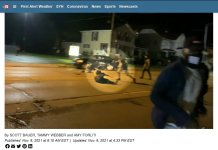I've watched the videos many times and no matter how many times and angles--at least at the seconds between he goes hands-up and he gets shot by Rittenhouse--I don't see him pointing the gun directly at his head--ever--as is claimed by Rittenhouse.
Just for consideration, were any of those views and angles you watched from Rittenhouse's point of view? A camera, or even a person right next to you looking the same direction you're looking may not see exactly what you see.
The camera's angle and the depth perception of a 2d image can create an entirely believable but false picture. The movie industry relies on that. I have a picture (some where..) that "absolutely shows" me pointing a gun at someone's head. FROM THE ANGLE OF THE CAMERA. Had the camera angle been 90 degrees to the side it would "absolutely show" the gun was not pointed at his head but was pointed on a line parallel to his head and two FEET behind him.
The point here is that it doesn't matter if the gun was actually pointed directly at KR or not. What matters is the situation that KR believed he was in, and how he responded to that.
As to "enhanced" images, well here's where modern tech and ancient perceptions collide. Kind of makes a difference how you refer to them, too.
What is today's "enhanced image" is yesterday's "doctored" or "altered" photograph. Hell, my wife has a phone that can take a picture of me and turn it into a "bearded lady" if she pushes the right button.
The point here, for the defense, is not to claim the image was altered to harm his client (without evidence to support that) but that the image WAS ALTERED, and it COULD HAVE BEEN changed in a manner to show something that really wasn't. Reasonable doubt.
SO, yes, if they show an image, claiming that it shows reality, and admit that image has been altered, doctored, photoshopped, enhanced, or what ever term you want to apply, then they have a burden of proof to show, and explain HOW that image was altered, and why, and that includes "the software did it".
Like Lab tests (all of them) there are standards, and calibration requirements for the test equipment which in court may be accepted at face value or may be challenged.
Once again, I tip my hat to the people who made "MY COUSIN VINNY" for including a scene that illustrates that. Forensic expert testifies that samples from the crime scene were an exact match to samples taken from the tires of the defendant's car. He's then asked how he came to that conclusion, and he testifies about the make and model of the gas chromatograph used for the analysis. The prosecutor then addresses the jury and forcefully states "IDENTICAL!!" implying that it had to have been the defendant's car that left the marks.
That point is countered when the defense asks the expert what is the most popular make & size tire sold in America and he ..somewhat reluctantly admits that it is the same one the defendants have on their car.
The point here is that lab tests, imagery, and other evidence while it may be factually completely accurate can be presented to the jury (and the public) in such a manner as to support an incorrect conclusion.


